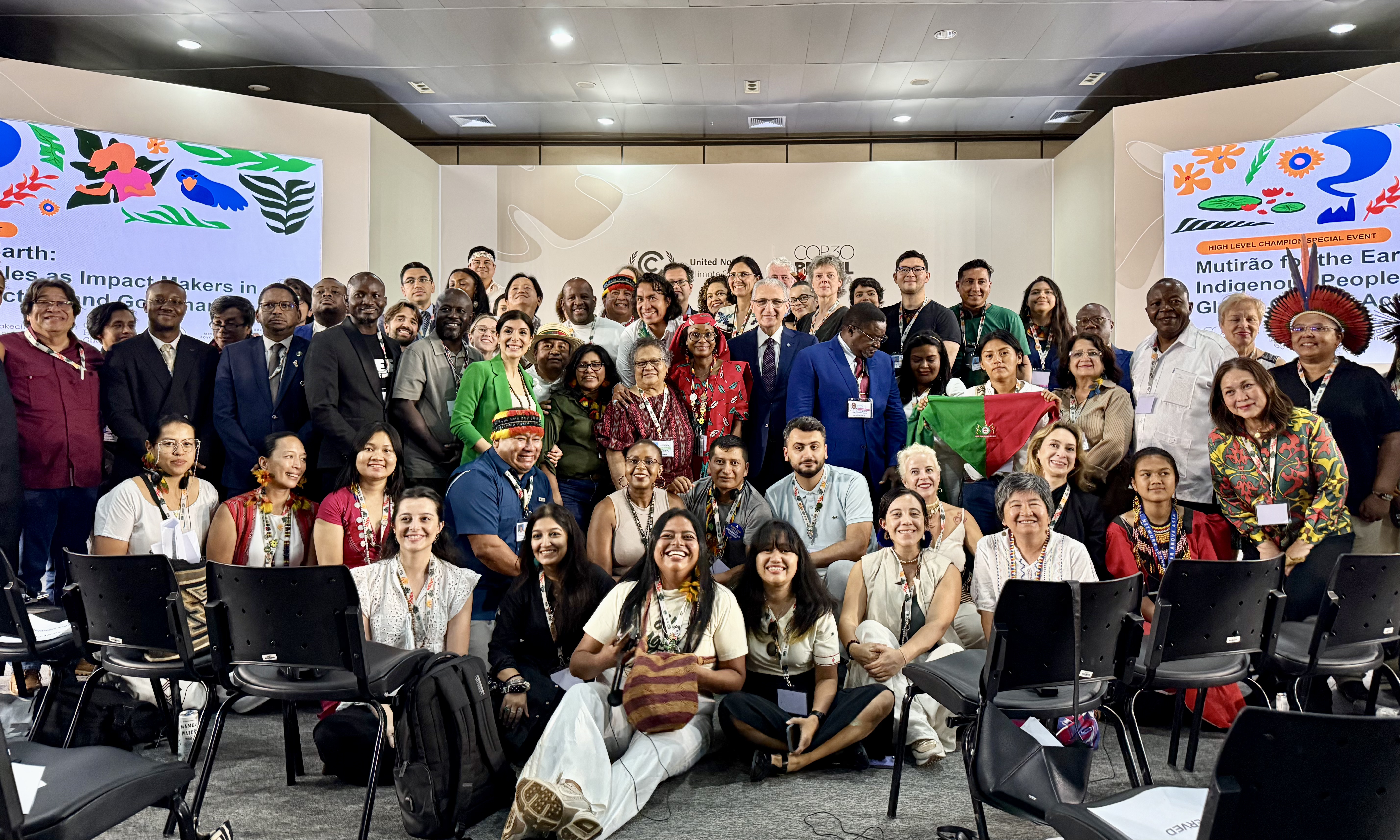Event showcases indigenous leadership in global climate governance
In line with the spirit of the Mutirão, the event connected local realities to global commitments, advancing toward a just, inclusive, and sustainable future for all

By Rafaela Ferreira and Bianca Buenaño / COP30
A panel aimed at amplifying the voices and leadership of Indigenous peoples in Global Climate Action was held on Friday, 14 November, at COP30 in Belém (PA). The event sought to provide a platform to showcase initiatives and results that promote inclusive climate governance. During the occasion, the International Indigenous Peoples Commission also presented a report on the State of Indigenous Participation in Climate Governance, which will be finalized and released at the end of the conference.
Entitled “Mutirão for the Earth: Indigenous Peoples as Agents of Impact in Global Climate Action and Governance,” the event connected local realities to global commitments, advancing toward a just, inclusive, and sustainable future for all. The debate was an initiative of the Ministry of Indigenous Peoples (MPI) and the High-Level Champions for Climate, in collaboration with the Commission of Indigenous Peoples and the International Indigenous Peoples Forum on Climate Change (IIPFCC).
Present at the event, COP29 President Mukhtar Babayev emphasized the collective responsibility to work alongside Indigenous peoples to ensure their effective participation and that they benefit from the outcomes of climate action. “We need an inclusive process to achieve equally inclusive results. The protection of Indigenous peoples is at the center of the negotiations of COP29 and COP30. We applaud Brazil’s leadership, which places global climate ambition at the core of its actions,” he stated.
Nigar Arpadarai, COP29 High-Level Champion for Climate, affirmed that governments alone cannot solve the climate crisis. “Real progress depends on an approach that engages the whole of society, bringing together cities, regions, businesses, investors, the private sector, Indigenous peoples, and civil society. The Action Agenda was born from this understanding. It must serve as a bridge between political ambition and tangible progress,” she said.
During Panel 2, which focused on sharing lessons learned and demands from Indigenous peoples in Global Climate Action, Juan Carlos Jintiach, Executive Secretary of the Global Alliance of Territorial Communities, called for unity: “Together, we move forward. Unity will bring redemption, and we must not lose hope because human rights are fundamental: free, prior, and informed consent; land titling; decriminalization; an end to crimes against us; ancestral knowledge; and major commitments to nature. Let us move ahead.”
International Indigenous Peoples Commission
The International Indigenous Peoples Commission is composed of representatives from Indigenous organizations around the world and is coordinated by the Ministry of Indigenous Peoples of Brazil. The Commission seeks to contribute Indigenous perspectives to the preparatory processes of COP30 and to support actions under the four pillars of the conference: Mobilization, Action Agenda, Negotiation, and Leaders’ Summit.
This initiative is part of the Circle of Peoples, which fosters dialogue to ensure meaningful Indigenous representation at the center of COP30 processes and to enhance recognition of the role of traditional territories and cultures in addressing the climate crisis.
According to Francisco Filippo, Chief Advisor for International Affairs at the MPI, the Commission’s main goal has always been to expand Indigenous participation and representation in negotiation processes, particularly at COP30. “This is the objective that Minister Sônia Guajajara and the Brazilian government have set for international engagement as a whole, and especially for climate negotiations,” he said.
“Without amplifying Indigenous voices, ensuring effective processes for a just transition, and securing adequate financing for the best biodiversity conservation policies—those led and implemented by Indigenous peoples—the entire planet will fail,” Filippo stated.
At the conclusion of COP30, a report on the State of Indigenous Participation in Climate Governance will be launched. The document, currently under preparation, will be presented to the International Indigenous Peoples Commission (IIPC) and will highlight the establishment, purpose, and contributions of the Commission in strengthening Indigenous participation in global climate governance. It will also include recommendations and priorities identified throughout the process, reflecting the perspectives and collective experiences of Indigenous representatives engaged in the Commission’s work in preparation for COP30.
